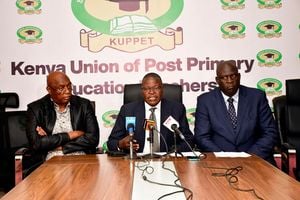
Parliament in session.
Members of Parliament held an emergency session to discuss the government's poor preparations for junior schools before the pioneer class of the Competency Based Curriculum (CBC) moves to Grade 9 in January.
While debating an adjournment motion sponsored by Kathiani MP Robert Mbui, lawmakers cited the lack of construction of classrooms and laboratories as well as the deployment of adequate teachers among the challenges that will disadvantage learners in public junior schools.
To illustrate the magnitude of the problem, the MPs noted that 32,469 classrooms and laboratories need to be constructed in all primary schools to accommodate the 1.5 million learners who will move to Grade 9 in January 2025. There are approximately 23,000 public primary schools.
They lamented that with only three months to the end of the year, infrastructure in all primary schools hosting junior schools was in a deplorable state.
The lawmakers urged the government to act quickly to solve the problems.
The laboratories, the MPs said, will help in the learning of practical subjects currently offered in Grade 9 such as integrated science, pre-technical science, health education, agriculture and home science.
"This is an emergency. When we had Covid-19, we spent billions of shillings. We need to spend money so that our children can go to school next year," said Mr Mbui.
"How many teachers are prepared for this curriculum? Who will teach subjects like health education because our current curriculum in teacher training colleges is for two subject combinations? Mr Mbui asked.
Lugari MP Nabii Nabwera said to avert the impending crisis, the government should use the contingency fund to start constructing classrooms to accommodate learners who will be moving to Grade 9.
Mr Nabwera also urged the government to give a conditional grant of Sh21 billion to the Constituency Development Fund to build classrooms in the next three months.
He said as a matter of urgency, the government must also immediately start recruiting 20,000 teachers in October so that they are on board by December and ready to start teaching in January 2025.
"This is a matter that requires money from the emergency kitty. If we really care about our children, let's use this money to build the necessary infrastructure," said Nabwera.
Kabondo Kasipul MP Eva Obara pointed out that while the national government's Constituency Development Fund and the Ministry of Education had built some infrastructure, the money received through the CDF was not enough to address all the challenges.
She said teachers who never studied science at university are being forced to teach it, but are not qualified to do so.
"We have three months to think about how these children are going to get through. Can we build enough classrooms in that time? Let's be realistic. Let the government change course and put these children in secondary schools," said Dr Obara.
Bumula MP Jack Wamboka echoed the same sentiments, saying that the next batch of junior school leavers should be accommodated in secondary schools that will have space when Form Four students leave after sitting the Kenya Certificate of Secondary School (KCSE) exams this year.
"We have a situation where classrooms will be vacant but we are struggling to accommodate these students in primary schools where we don't have classrooms and other infrastructure," Mr Wamboka said.
Mr Wamboka said the construction of Grade 9 classrooms in his constituency was less than five per cent.
Moiben MP Phylis Bartoo said there was a disconnect between implementers, policymakers and consumers of the new education system.
“We don’t have enough classrooms, infrastructure. Let’s start by employing the 46,000 teachers who are currently interns then re-tool them so that our children are not disadvantaged from January,” Dr Bartoo said.
“If we don’t move with speed, we will be compromising the standards of education for our children and we don’t want them to be turned away when they go to look for jobs internationally,” she added.
"We want them to be the best,” she added.









